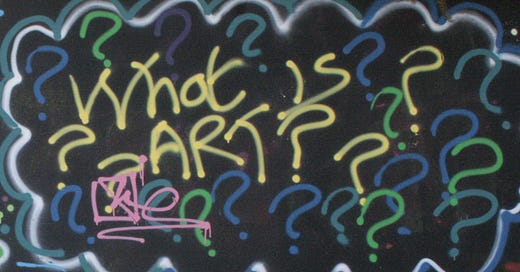The footnoted minutia of reality
Peloton porn, sad dad bands, Wikipedia, monkey queens, meta-raves and cloned petfluencers
Hi friends. Today is January 21, 2022.
And this week’s newsletter is an ode to Wikipedia, the internet’s highest (slash only?) arbiter of truth.
Over the past 10 days or so, Wikipedia has found itself in the crosshairs of Twitter-happy cryptobros, enraged that editors hesitated to include NFTs in a prominent art article. On December 6, that article — “List of most expensive artworks by living artists” — was updated to include “Merge,” a mysterious $92-million project from the digital artist Pak.
From the drop, however, some regular Wikipedians had questions. For instance, could “Merge” really be considered the world’s single largest auction if thousands of people bid up pieces of it? Does it matter if NFTs confer ownership, versus literal possession of a work? By January 1, the article’s talk page — the place where Wikipedians hash out disputes — had predictably devolved into a zealous, ongoing 12,000-word debate on the nature of art, technological change, consensus and truth.
“This is pretty messed up to see,” tweeted a co-founder of Nifty Gateway, the digital art marketplace that (coincidentally!) sold and promoted “Merge.” “Wikipedia mods are trying to say that *no* NFT can be art.”
That isn’t quite accurate, however. Good Wikipedians would never be so bold. As explained several times by veteran editor Nathan Drezner, the question isn’t actually whether NFTs are art … it’s whether enough experts have published on the narrow, esoteric subject of virtual art sales to meet Wikipedia’s exacting verifiability standards.
“Nobody here has argued … that NFTs are not art,” Drezner wrote on Jan. 6. “The argument is there is not enough consensus outside Wikipedia to categorize NFT sales alongside traditional sales.”
These types of arcane, nitpicky arguments are easily mocked; certainly the crypto crowd is having its go. But they also explain how Wikipedia still, after 20+ years and a zillion internet-culture revolutions, manages to wield some fragile authority in a hyper-polarized, cacophonous world.
Part of it comes down to a lawyerly unwillingness to let technicalities scope-creep into larger disagreements. Part of it is that unblinking focus on “verifiability” as opposed to “truth.” And part of it is a bottomless, masochistic enthusiasm for interrogating the footnoted minutia of reality until it crumbles to dust before you.
Anyway, as of this writing, a number of frequent Wikipedia editors have sided against NFT inclusion, at least for the immediate term. But as Wikipedians themselves will tell you, consensus can change! And the page’s most active editors are still requesting input.
If you read anything this weekend
“A Tinder Revenge Story,” by Jesse Barron in New York Magazine. Think Succession, except somehow more desperate and more morally bankrupt by virtue of the shitty rich people being real. At stake: both getting richer (naturally) and the IP that changed love and sex for a generation.
“How Tumblr Became Popular for Being Obsolete,” by Kyle Chayka in The New Yorker. Tumblr probably should’ve gone the way of Myspace and LiveJournal before it. But (somehow? improbably!) the favored micro-blogging platform of my late adolescence has hung on almost unchanged for 15 years, like a relic from an earlier internet.
“What Fast Fashion Costs the World,” by Ryan Lenora Brown in Experience. A fascinating dispatch from the African markets where people sell your “donated” clothes, which (surprise!) no one really wants and some countries have tried to discourage.
“How A.I. Conquered Poker,” by Keith Romer in The New York Times Magazine. Today’s elite poker players don’t just play each other — they basically play A.I./human teams. The humans place the bets and hold the cards; the A.I. optimizes strategies.
“A Grand Unified Theory of Buying Stuff,” by Paul Ford in Wired. “Each thing, each unit of stuff, came with its own, pet stuff — a stand, a foam cover, cords, a manual, a little drawstring case. The supply chain is fractal: Zoom in on your stuff and there's more stuff, ad infinitum.”
👉 ICYMI: The most-clicked link from last week’s newsletter was this feature on “millennial pink’s” successor.


Postscripts
Why Netflix keeps raising its prices. How a volcano knocked all of Tonga offline. What your favorite sad dad band says about you and what cozy around the world looks like. The Peloton porn was inevitable. The “AI girlfriend” abusers were too. The slut-shaming of the green M&M, though? They really didn’t have to.
The case for keeping your Christmas tree up. People’s court, but for platforms. The problem with “just Googling” free Covid tests. (Also: Make sure you get yours!!) Inside a metaverse “rave,” of sorts. How crypto caught on with Republicans. They’ve got more Greek-lettered male archetypes now than variants of Covid. Yakei 2024. Please: Adopt don’t clone. And last but absolutely not least: “After checking Civil Aviation Authority regulations … the rescuers calculated they could attach a single sausage to a drone.”
That’s it for this week! Until the next one. Warmest virtual regards.
— Caitlin





